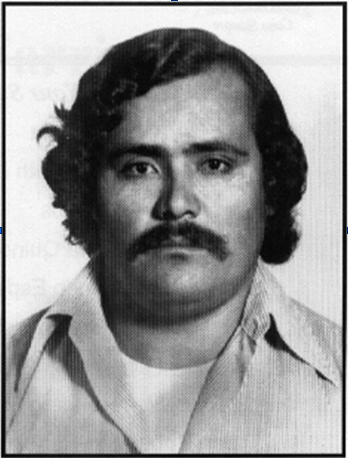
Thirty-nine years ago, on Feb. 10, 1979, 22 days into a bitter vegetable strike, Rufino Contreras, 28, and half a dozen fellow strikers walked into an Imperial Valley lettuce field owned by Mario Saikhon to talk with a crew of imported scabs. Three armed company foremen opened up with a vicious crossfire. Rufino fell face down in a muddy row, shot in the face. His father Lorenzo, brother Jose Luis, and other Saikhon strikers tried to aid Rufino, but they were kept away for more than an hour by continuing gunfire from the foremen. Finally, sheriff’s deputies arrived and called an ambulance. Rufino died in the hospital.
Rufino had not been on the picket line for several days because he was caring for his 25-year old wife, Rosa, who was in the hospital after being seriously burned in an accident at their home in Mexicali, just across the border in Mexico. They had a son, Julio Cesar, 5, and a daughter, Nancy Berenice, 4. The day before he died, Rufino proudly showed his friends papers affirming his wife was covered under the United Farm Workers’ medical plan. He was a loyal union member and wanted to return to the picket line.
The day after the shooting, Cesar Chavez’s wife, Helen, accompanied Contreras family members to tell Rosa her husband was dead. Through her profound grief, she described Rufino as a kind and gentle husband and father who never drank at bars at night and always put his family first. Rosa, heavily bandaged and in a wheelchair, went to see her husband’s body at the funeral home with Helen Chavez at her side. Leaving, she said to Rufino, “Vete tranquilo, mi amor. Yo cuidare a tus hijos” (“Go in peace, my love. I will take care of your children”).
Lorenzo Contreras said his son was a hard worker who always did his best for the grower, Saikhon. He hadn’t missed a single day of work as a lettuce cutter in two years, even when suffering from a bad case of the flu. When Cesar Chavez visited the Imperial Valley, Rufino volunteered for all-night security shifts and was still at work by 5 a.m. for a day of arduous labor in the fields.
The three foremen were quickly released on $5,000 each, the lowest bond for murder in memory, by Superior Court Judge William Lenhardt. The judge’s wife earlier joined 300 grower wives and other Anglo high school students and townspeople in a futile one-day attempt to harvest lettuce in a struck field. The judge later dismissed charges against the foremen because he said there was no way to prove which of the three fired the fatal bullet.
Thousands of farm worker mourners held candlelight marches through the streets of the small Imperial Valley border town of Calexico. Many more attended an outdoor funeral mass there on Feb. 14, using a flatbed truck as an alter at “El Hoyo,” a shape up area where farm workers showed up to get jobs next to the U.S.-Mexico border fence. Those at the mass, including Gov. Jerry Brown, will never forget a weeping Rosa Contreras, still bandaged and in a wheelchair from her injuries, being hugged by her young son, Julio Cesar. The child broke into uncontrolled cries of “Mi papa, mi papa, mi papa.”
Cesar eulogized Rufino during the service:
Feb. 10, 1979, was a day of infamy for farm workers. It was a day without joy. The sun didn’t shine. The birds didn’t sing. The rain didn’t fall.
Why was this such a day of evil? Because on this day greed and injustice struck down our brother Rufino Contreras.
What is the worth of a man? What is the worth of a farm worker? Rufino, his father and brother together gave the company 20 years of their labor. They were faithful workers who helped build up the wealth of their boss, helped build up the wealth of his ranch.
What was their reward for their service and their sacrifice? When they petitioned for a more just share of what they themselves produced, when they spoke out against the injustice they endured, the company answered them with bullets; the company sent hired guns to quiet Rufino Contreras.
Capitol and labor together produce the fruit of the land. But what really counts is labor: the human beings who torture their bodies, sacrifice their youth and numb their spirits to produce this great agricultural wealth—a wealth so vast that it feeds all of America and much of the world. And yet the men. women and children who are the flesh and blood of this production often do not have enough to feed themselves.
But we are here today to say that true wealth is not measured in money or status or power. It is measured in the legacy that we leave behind for those we love and those we inspire.
In that sense, Rufino is not dead. Wherever farm workers organize, stand up for their rights and strike for justice, Rufino Contreras is with them.
Rufino lives among us. It is those who have killed him and those who have conspired to kill him who have died; because the love, the compassion, the light in their hearts have been stilled…
This is a day of sorrow, but it is also a day of hope. It is a time of sadness because our friend and brother is dead. It is a time of hope because we are certain that Rufino today enjoys the justice in heaven that was denied him on earth.
It is our mission to finish the work Rufino has begun among us, knowing that true justice for ourselves and our opponents is only possible before God, who is the final judge.
Rufino Contreras became one of five UFW martyrs, four men and one woman who lost their lives during farm worker strikes. Today, the farm worker movement remembers Rufino Contreras and his family, and draws inspiration from his sacrifice.
